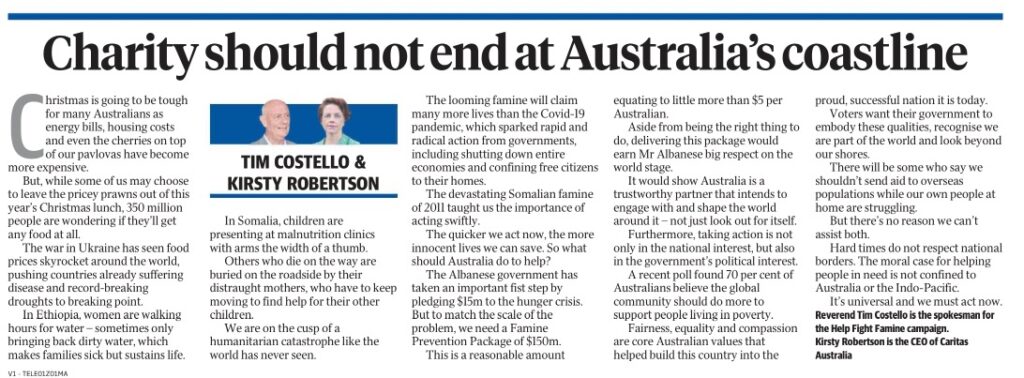
Christmas is going to be tough for many Australians as energy bills, housing costs and even the cherries on top of our pavlovas have become more expensive.
But, while some of us may choose to leave the pricey prawns out of this year’s Christmas lunch, 350 million people are wondering if they’ll get any food at all.
The war in Ukraine has seen food prices skyrocket around the world, pushing countries already suffering disease and record-breaking droughts to breaking point.
In Ethiopia, women are walking hours for water – sometimes only bringing back dirty water, which makes families sick but sustains life.
In Somalia, children are presenting at malnutrition clinics with arms the width of a thumb.
Others who die on the way are buried on the roadside by their distraught mothers, who have to keep moving to find help for their other children.
We are on the cusp of a humanitarian catastrophe like the world has never seen.
The looming famine will claim many more lives than the Covid-19 pandemic, which sparked rapid and radical action from governments, including shutting down entire economies and confining free citizens to their homes.
The devastating Somalian famine of 2011 taught us the importance of acting swiftly.
The quicker we act now, the more innocent lives we can save. So what should Australia do to help?
The Albanese government has taken an important fist step by pledging $15m to the hunger crisis. But to match the scale of the problem, we need a Famine Prevention Package of $150m.
This is a reasonable amount equating to little more than $5 per Australian.
Aside from being the right thing to do, delivering this package would earn Mr Albanese big respect on the world stage.
It would show Australia is a trustworthy partner that intends to engage with and shape the world around it – not just look out for itself.
Furthermore, taking action is not only in the national interest, but also in the government’s political interest.
A recent poll found 70 per cent of Australians believe the global community should do more to support people living in poverty.
Fairness, equality and compassion are core Australian values that helped build this country into the proud, successful nation it is today.
Voters want their government to embody these qualities, recognise we are part of the world and look beyond our shores.
There will be some who say we shouldn’t send aid to overseas populations while our own people at home are struggling.
But there’s no reason we can’t assist both.
Hard times do not respect national borders. The moral case for helping people in need is not confined to Australia or the Indo-Pacific.
It’s universal and we must act now.
Reverend Tim Costello is the spokesman for the Help Fight Famine campaign.
Kirsty Robertson is the CEO of Caritas Australia